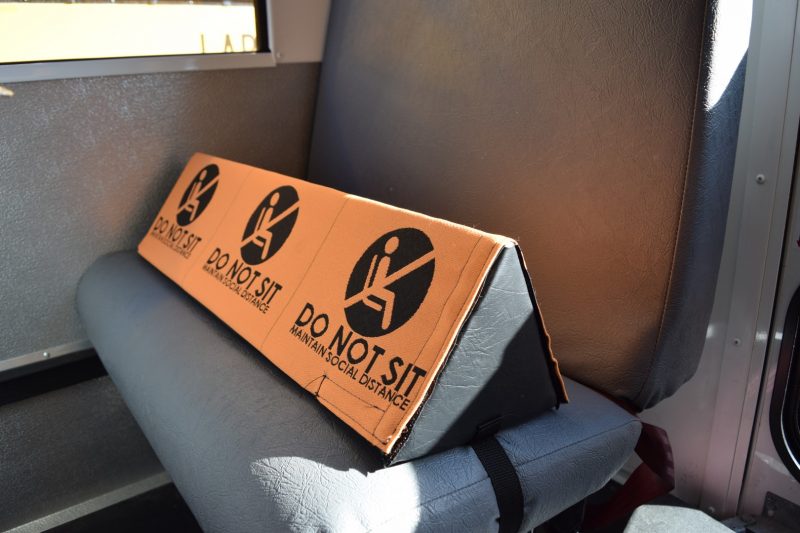A recent study conducted by the not-for-profit organization MITRE shows that lowering windows, using fans, and having drivers and passengers on a bus wear masks cuts down significantly on the spread of potentially infectious particles.
Opening windows and using existing fans on a bus was shown to reduce exhaled airborne particles by up to 84%, and thereby could lower the risk of COVID-19 exposure, according to research by MITRE using buses provided by the City of Colorado Springs Mountain Metro Transit and Colorado Springs School District 11. Wearing a mask alone can also reduce the spread of potentially infectious particles by 50% or more depending on the quality of the mask.
Those are the key findings of a MITRE study to test aerosol dispersion on buses and determine the best methods to control potentially infectious airborne particles such as COVID-19. When an infected person exhales, sneezes, or coughs, they create small aerosol particles containing the disease, which then spreads or is dispersed throughout the air space in the bus.
The study included more than 84 test runs on both school buses and low-floor transit buses using a mechanical cough simulator that dispersed the test aerosol while the buses drove normal routes over 10 days between August 3 and September 4, 2020. The safe sodium chloride test aerosol generated a variety of particle sizes down to 300 nanometers—similar to a human cough—and were detected by 28 sensors placed throughout the passenger areas.
Key findings and recommendations related to seating include:
- The back row of seats tend to accumulate more particles.
- Consider seating arrangements that only allow for same-household passengers to sit together.
- Social distancing of six feet is not practical on most buses, but any extra distance allows the air movement to reduce exposure to infectious particles.
Read the full press release and study findings.
Freedman PPE

Last year, Freedman Seating, North America’s leader in passenger seating and safety, announced a line of passenger protective equipment (PPE) to help protect passengers against the spread of germs and airborne viruses.
Social distance seat bands and triangles block passenger seats from being used, and may be especially useful in the back row of a commercial or school bus, where more harmful particulates tend to accumulate, according to the study.
Passenger and Driver Sneeze Guards protect from sneezes, coughs, droplets and other airborne germs. Unlike similar, more expensive products on the market, Freedman’s guards are made from a soft, clear vinyl that is replaceable, easy to clean, UV and Mildew resistant, and most importantly safe. These barriers will not present a potential laceration hazard during an incident unlike plexiglass which can crack.
This new line of safety enhancement adds another layer of protection to the industry’s most trusted seating products, which are always tested to meet or exceed motor safety standards.
*Freedman Seating Company did not take part in MITRE’s study. The purpose of this article is to offer solutions based on the recommendations related to seating.
